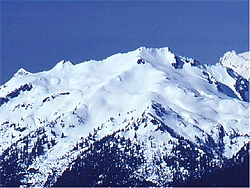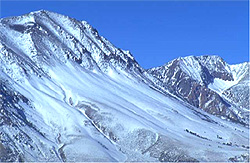Neuroscience For Kids
Mountain Climbing: Hazardous to Your Brain?
 May 11, 2008
May 11, 2008
Climbing the world's tallest mountains is risky business. The brave people who attempt these treks try to avoid avalanches, falling rocks, crevasses, frostbite, and dehydration. Should high altitude climbers worry about the risk of brain damage? Research conducted by scientists in Zaragoza, Spain, suggests that brain damage IS an added risk to some climbers.
The scientists examined brain scans of 35 climbers (12 professional climbers and 23 amateur climbers; 33 men and 2 women) who climbed either Mt. Everest (8,848 m; 20,030 ft), Mt. Aconcagua (6959 m; 22,832 ft), Mt. Blanc (4,810 m; 15,782 ft) or Mt. Kilimanjaro (5,895 m; 19,341 ft). Each climb was made without extra oxygen.

Within 7 to 15 days after a climb, the researchers examined the brains of the climbers using magnetic resonance imaging (MRI). The brain scans of the climbers were compared to brain scans of 20 healthy people of similar ages (the control group).
 Of the 13 climbers (12 professional, 1
amateur) who started up Mt. Everest, only three made it to the summit,
three made it to 8,100 m, and seven made it to 6,500-7,500 m. Only 1
climber had a normal brain scan! The brain scans of the other climbers
showed signs of damage to the cerebral cortex (8 climbers) and an
enlargement of the Virchow-Robin (VR) space (11 climbers). (VR spaces
surround blood vessels that enter the brain and are rarely enlarged in
young people.)
Of the 13 climbers (12 professional, 1
amateur) who started up Mt. Everest, only three made it to the summit,
three made it to 8,100 m, and seven made it to 6,500-7,500 m. Only 1
climber had a normal brain scan! The brain scans of the other climbers
showed signs of damage to the cerebral cortex (8 climbers) and an
enlargement of the Virchow-Robin (VR) space (11 climbers). (VR spaces
surround blood vessels that enter the brain and are rarely enlarged in
young people.)
 All eight Mt. Aconcagua climbers showed brain damage and/or
enlarged VR spaces even though only five made it to the 6,000-6,400 m
level and one reached only 5,500 m. Abnormalities in the brain scans were
seen three years later even though the climbers did not attempt another
high altitude expedition. Climbers who trekked up Mt. Blanc and Mt.
Kilimanjaro had fewer abnormal brain scans. All seven climbers made it to
the top of Mt. Blanc and three had abnormal brain scans. Only one
Kilimanjaro climber (three made it to the summit) had an abnormal brain
scan. None of the brain scans from control subjects showed signs of brain
damage and only two brain scans from these people showed enlarged VR
spaces.
All eight Mt. Aconcagua climbers showed brain damage and/or
enlarged VR spaces even though only five made it to the 6,000-6,400 m
level and one reached only 5,500 m. Abnormalities in the brain scans were
seen three years later even though the climbers did not attempt another
high altitude expedition. Climbers who trekked up Mt. Blanc and Mt.
Kilimanjaro had fewer abnormal brain scans. All seven climbers made it to
the top of Mt. Blanc and three had abnormal brain scans. Only one
Kilimanjaro climber (three made it to the summit) had an abnormal brain
scan. None of the brain scans from control subjects showed signs of brain
damage and only two brain scans from these people showed enlarged VR
spaces.
At high altitudes, the lack of oxygen can damage nerve cells. Also, blood vessels may leak and cause brain swelling. The risk of stroke is also higher. Mountain climbing may provide a great sense of accomplishment, but it may also come at the cost of damage to the brain. Further experiments will need to be conducted to determine if the climbers' cognitive abilities have been affected.

Reference:
- Fayed, N., Modrego, P.J., and Morales H., Evidence of brain damage after high-altitude climbing by means of magnetic resonance imaging, American Journal of Medicine, 119:168.e1-6, 2006.
Copyright © 1996-2008, Eric H. Chudler, University of Washington
